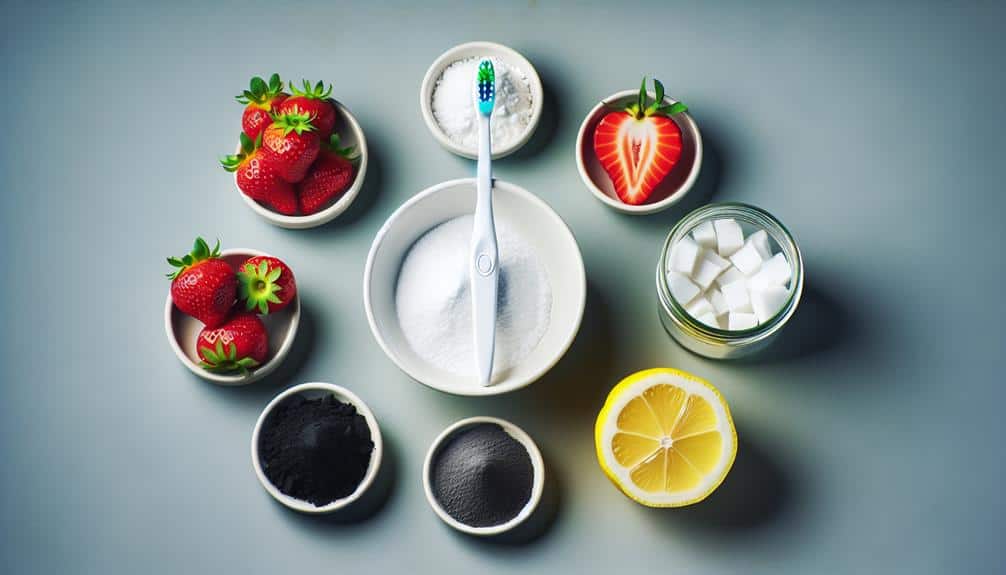To achieve a dazzling white smile, consider the importance of professional teeth whitening for reliable and efficient results using high-quality products tailored to your specific needs. Understand the different whitening methods like DIY options for mild discoloration or professional treatments with stronger bleaching agents. Maintain your whitened teeth by implementing a consistent oral hygiene routine, using whitening toothpaste, and avoiding staining foods and beverages.
Be cautious with abrasive toothpaste and acidic foods to prevent enamel erosion, and explore long-lasting results with whitening toothpaste containing special ingredients or natural remedies like baking soda paste. These expert secrets provide the key to luminous teeth and glowing confidence.
Key Points
- Professional teeth whitening for reliable results using high-quality products.
- Maintain oral hygiene with whitening toothpaste and floss.
- Avoid staining foods and beverages for a brighter smile.
- Choose non-abrasive toothpaste and limit acidic foods.
- Incorporate natural remedies like baking soda and oil pulling for long-lasting whiteness.
Importance of Professional Teeth Whitening
If you desire a noticeably brighter and more radiant smile, opting for professional teeth whitening services can greatly enhance the whiteness of your teeth. While there are cost-effective alternatives available in the market, such as DIY home remedies, professional teeth whitening is a reliable and efficient way to achieve a dazzling white smile.
Professional teeth whitening procedures are performed by trained professionals who use high-quality products and advanced techniques to guarantee excellent results. These treatments are tailored to your specific needs, ensuring that you achieve the level of whiteness you desire without causing any damage to your teeth or gums.
Compared to DIY home remedies, professional teeth whitening offers a faster and more long-lasting solution. The results are often visible after just one session, saving you time and effort in the long run. Additionally, professional treatments are safer and more effective, providing you with a whiter smile that you can confidently flaunt.
Understanding Different Whitening Methods
To broaden your knowledge on achieving a dazzling white smile, let's explore the various methods available for teeth whitening. When considering teeth whitening, you'll encounter two main categories: DIY vs. professional and natural vs. chemical methods.
DIY methods involve at-home kits, strips, or toothpaste, offering convenience and affordability. These options are suitable for mild discoloration but may not provide as dramatic results as professional treatments. On the other hand, professional whitening treatments, often performed by dentists, utilize stronger bleaching agents for more significant whitening effects. These procedures are tailored to individual needs, ensuring ideal results.
When it comes to the ingredients used, natural whitening methods focus on organic compounds like baking soda or activated charcoal to gently remove stains. Conversely, chemical whitening treatments employ hydrogen peroxide or carbamide peroxide to penetrate deeper into the enamel, effectively lifting tough stains.
Understanding the differences between these methods will help you make an informed decision based on your desired level of whitening and budget constraints.
Tips for Maintaining Whitened Teeth
Maintain your whitened smile by implementing a consistent oral hygiene routine and making smart lifestyle choices. Keeping your teeth white requires dedication to good oral hygiene practices. Brush your teeth at least twice a day with a whitening toothpaste to remove surface stains and prevent yellowing. Floss daily to remove plaque and debris from between your teeth, which can cause discoloration if left unchecked. Consider using a whitening mouthwash to help maintain your bright smile between touch-up treatments.
In addition to oral hygiene, your lifestyle choices play a significant role in the longevity of your whitened teeth. Avoid foods and beverages that are known to cause staining, such as coffee, tea, red wine, and dark sodas. If you do consume these items, be sure to rinse your mouth with water afterward. Quitting smoking is also vital for maintaining white teeth, as tobacco can cause stubborn stains that are difficult to remove. By combining good oral hygiene practices with mindful lifestyle choices, you can enjoy a dazzling white smile for years to come.
Foods and Habits to Avoid
To maintain a dazzling white smile, it's important to be mindful of the foods and habits you should avoid. Initially, be cautious with your toothpaste choices. Some toothpaste brands contain abrasive ingredients that can wear down enamel, leading to discoloration. Opt for non-abrasive formulas to protect your teeth's whiteness.
Acidic foods are another culprit that can harm your pearly whites. Citrus fruits, tomatoes, and vinegar can erode enamel, making teeth more susceptible to staining. Limiting the consumption of these acidic foods can help preserve the brightness of your smile.
Coffee stains are a common concern for many. The dark pigments in coffee can easily adhere to enamel, causing unsightly discoloration. If you can't give up your daily cup of joe, consider using a straw to minimize contact with your teeth.
Smoking is significant for its detrimental effects on oral health. The chemicals in tobacco not only stain teeth but also harm gum tissue, leading to a dull and unhealthy smile. Quitting smoking is an important step towards achieving and maintaining a radiant white smile.
How to Achieve Long-Lasting Results
Being mindful of your daily oral care routine and making informed choices can greatly contribute to achieving long-lasting results for a dazzling white smile. One way to maintain your bright smile is by using whitening toothpaste. These toothpastes contain special ingredients that help remove surface stains and prevent yellowing. Look for products with gentle abrasives like baking soda and hydrogen peroxide for effective whitening toothpaste benefits.
In addition to using whitening toothpaste, you can explore natural remedies for stains. Baking soda mixed with water to create a paste can act as a mild abrasive to scrub away surface stains. Another natural remedy is oil pulling with coconut oil, which can help remove bacteria and plaque that cause discoloration. Also, incorporating crunchy fruits and vegetables like apples and carrots into your diet can help naturally clean teeth and prevent staining.
Frequently Asked Questions
Can Teeth Whitening Affect the Sensitivity of My Teeth?
Teeth whitening can impact tooth sensitivity. To manage this, use desensitizing toothpaste before whitening. During the whitening process, opt for products with lower concentrations of bleaching agents. Following these steps can help minimize discomfort and achieve a dazzling smile.
Is It Safe to Whiten My Teeth if I Have Dental Restorations Like Crowns or Fillings?
If you have dental restorations like crowns or fillings, it's generally safe to whiten your teeth, but talk to your dentist first. Some whitening treatments may not affect these restorations, while others could alter their color.
How Often Should I Touch up My Teeth Whitening Treatment?
To maintain whitening effects, touch up your teeth every 6 months. Consistent touch-ups yield lasting results. Remember, the frequency of touch-ups is key to a dazzling white smile. Keep up with your routine for best results.
Are There Any Natural Remedies for Teeth Whitening That Are Effective?
To naturally whiten teeth effectively, consider using fruit peels like orange or banana, baking soda paste, oil pulling with coconut oil, and activated charcoal occasionally. These methods can help maintain a brighter smile without harsh chemicals.
Can Teeth Whitening Cause Damage to the Enamel of My Teeth?
Like a shield protecting a castle, enamel shields your teeth. Teeth whitening, when done correctly, can maintain enamel protection and prevent sensitivity. It's important to consult a professional for safe and effective whitening procedures.



